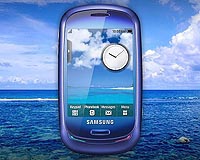| . |  |
. |
Washington (AFP) March 30, 2010 US President Barack Obama is determined to further develop a "positive relationship" with China, the White House said in comments welcomed by Beijing as the two powers seek to overcome deep strains in their ties. Obama made the remarks late Monday after receiving China's new ambassador to the United States, Zhang Yesui, according to a statement from White House spokesman Robert Gibbs. "During their meeting, the president stated his determination to further develop a positive relationship with China," Gibbs said. Ties between the two powers have been dogged in recent months over a host of issues, including a long-standing dispute over the value of the yuan, US arms sales to Taiwan, Internet freedom, and a visit by the Dalai Lama to the White House. Obama stressed Washington and Beijing must "work together and with the international community on critical global issues including nonproliferation and pursuing sustained and balanced global growth," Gibbs said. He also "reaffirmed" Washington's "one China" policy, under which the US recognizes Taiwan and Tibet as part of China, Gibbs said, adding the US leader supported "efforts made by Beijing and Taipei to reduce friction across the Taiwan Strait." China in response said it welcomed Obama's pledge to develop positive ties. "China praises the positive attitude of US President Barack Obama... in promoting China-US relations," foreign ministry spokesman Qin Gang said in a statement. He added that Beijing "values the reaffirmation by the United States of its commitment to China on the Taiwan and Tibetan issues." Taiwan and China have been governed separately since 1949, but Beijing considers the island part of its territory. Relations between the two have improved considerably since Taiwan President Ma Ying-jeou came to power. Washington angered Beijing on its bubbling issues over separatism with a 6.4-billion-dollar arms sale to Taiwan in January, and Obama's talks with the Tibetan spirtual leader the Dalai Lama at the White House the following month. The United States is also pressuring China to allow the yuan to appreciate, with lawmakers pushing the US Treasury to label Beijing a "currency manipulator" in a report due out next month. Qin acknowledged the recent difficulties, saying they were "not in the interest of the two countries." "China and the United States are nations that have important influence in the world," he said. "A good Sino-US relationship is in the fundamental interest of the two countries and their people, and is beneficial to peace, stability and prosperity in Asia and the world," Qin said. Beijing expressed willingness last week to move past strains in relations, with Qin insisting "dialogue and consultations on an equal footing" was the best way to put paid to bilateral tensions. The next round of high-level strategic and economic talks between the countries are expected to be held in Beijing in late May. US Secretary of State Hillary Clinton and Treasury Secretary Timothy Geithner are expected to represent the US side, while Vice Premier Wang Qishan and State Councillor Dai Bingguo will lead the Chinese delegation. The talks will be the highest-level meeting between the two sides since ties broke down earlier this year. The first round of the dialogue was held in Washington in July last year. Chinese Prime Minister Wen Jiabao said last week he was confident the two nations could work through the ongoing concerns, saying the dialogue would be "an opportunity to address the problems" between them.
Share This Article With Planet Earth
Related Links Global Trade News
 Japan considers end to cellphone 'SIM lock'
Japan considers end to cellphone 'SIM lock'Tokyo (AFP) March 29, 2010 Japan is moving towards ending restrictions on mobile telephone users switching operators or using an overseas network by changing the SIM memory card, a government official said Monday. The government has launched a review of the "SIM lock" system used by Japanese cellphone carriers to prevent people from using a handset from one operator on a rival network by replacing the SIM card. A ... read more |
|
| The content herein, unless otherwise known to be public domain, are Copyright 1995-2010 - SpaceDaily. AFP and UPI Wire Stories are copyright Agence France-Presse and United Press International. ESA Portal Reports are copyright European Space Agency. All NASA sourced material is public domain. Additional copyrights may apply in whole or part to other bona fide parties. Advertising does not imply endorsement,agreement or approval of any opinions, statements or information provided by SpaceDaily on any Web page published or hosted by SpaceDaily. Privacy Statement |